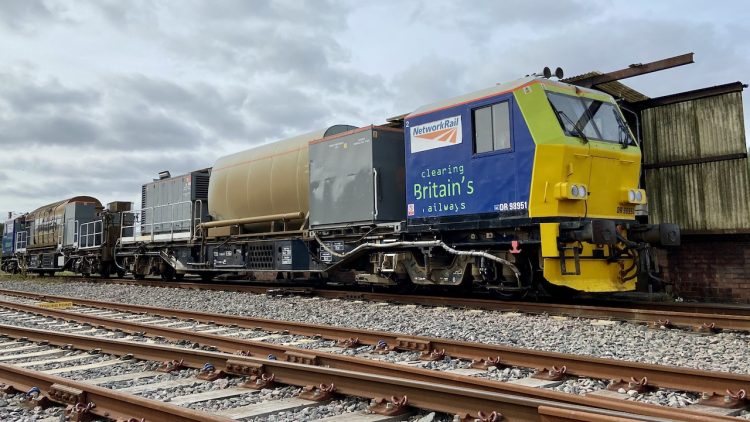Passengers and freight will be kept on the move in the North West this autumn as ‘leaf busting’ trains blast leaves off the line.
A fleet of special ‘leaf busting; trains are already out and about washing the tracks of leaf debris as trees shed their leaves this autumn. The special trains will cover approximately 96,000 miles of track across the North West region and will operate out of Network Rail‘s seasonal delivery depot, Wigan Springs Branch which is the centre of operations in keeping tracks clear between Crewe and Carlisle this autumn.
Six trains will be utilised to carry out the essential work including five Multi-Purpose Vehicles or MPVs which operate out of Wigan and a Rail Head Treatment Train or RHHT which works out of Carlisle Kingmoor depot in Cumbria.
Leaves falling from trees create difficulties in operating the railway as they fall and stick to damp rails and are then compressed by trains moving over them, forming a thin, black layer which causes issues with both braking and acceleration. Further problems are also caused for signallers as leaf mulch build-up can make it difficult to detect the position of a train which can cause a knock-on effect of delays. The problematic leaf fall season is likened by the rail industry to black ice on roads.

The specialist trains will clear the tracks using high-pressure water jets before applying a gel with a sand-like texture which supports passenger and freight trains wheels to grip the tracks. 77 Traction gel applicators have also been put in place throughout the network.
Further to the trains and traction gel applicators, specialised teams will also be out in action across the North West to check whether the treatments are effective and provide extra support where needed.
The North West route saw Network Rail spend £5 million during autumn 2021 in a bid to keep passengers and freight on the move.
Dave Shawcross, Network Rail seasons delivery manager, said: “Leaves on the line are a big problem for the railway. It disrupts services and inconveniences people’s journeys and every year, Network Rail and train operators work together to battle against the elements to get passengers and freight to their destinations.
“We are ready to keep people and goods moving across the North West by running a reliable service for our customers as they return to the railway as a safe and green way to travel.”
Rob Cummings, seasonal improvement manager at Northern, said: “We are working hard as an industry to clear leaves from the line and to keep disruption to a minimum during the autumn period.
“We have introduced special timetables on problematic routes to give our customers a more reliable service and our drivers also have advanced training to help develop techniques which further reduce the impact of slippery rails. We are also helping to develop new innovative technology that will reduce the impact of leaves on the line.”
Jerry Farquharson, service planning director at TransPennine Express, said: “Autumn conditions including wet weather combined with leaves on the line can create challenging conditions which can result in disruption and delays for our customers.
“Our modern trains are all fitted with devices that spray sand onto the tracks to provide extra grip but despite this, sometimes our drivers need to adapt the way they drive and slow down. We continue to work closely with our industry partners including Network Rail to keep customers moving and recommend that anyone travelling checks their journey prior to travelling.”
To find out more about how Network Rail deals with leaves on the track, please visit: www.networkrail.co.uk/leaves





Responses